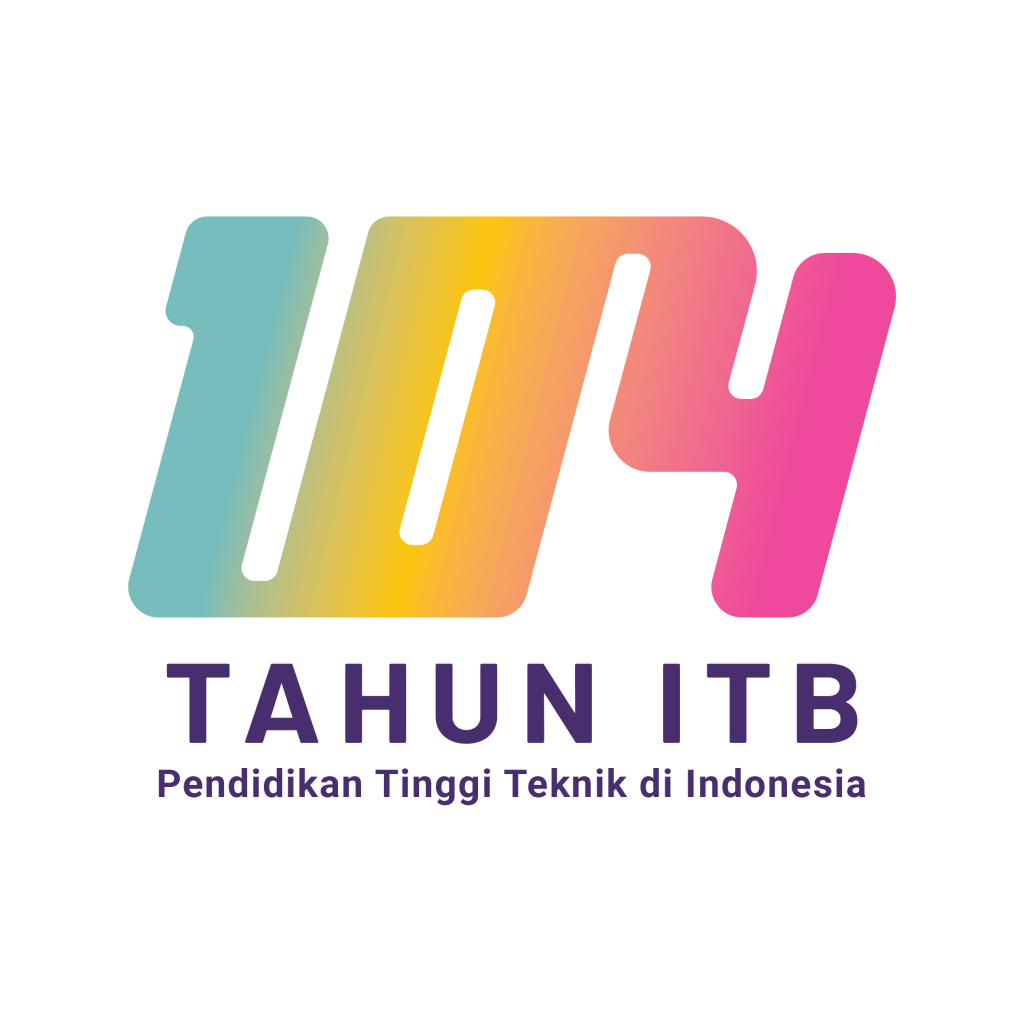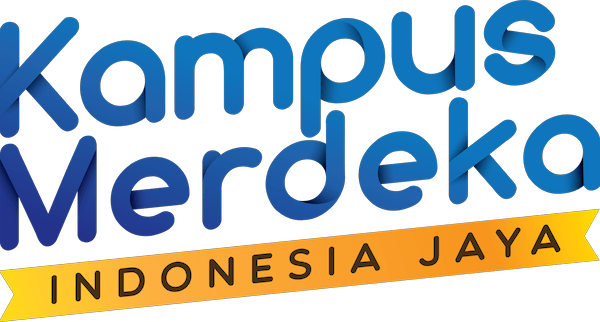[:id]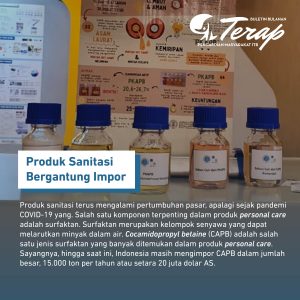
Industri kosmetik di Indonesia mengalami pertumbuhan pasar setiap tahunnya. Salah satu segmen penting dalam industri kosmetik adalah produk sanitasi yang mendorong pertumbuhan industri tersebut, terutama sejak pandemi COVID-19. Sayang, hingga saat ini Indonesia masih mengimpor bahan baku Cocamidopropyl betaine (CAPB) dalam jumlah besar, yaitu 15.000 ton/tahun atau setara 20 juta dolar AS.
CAPB merupakan surfaktan yaitu komponen terpenting dalam produk-produk personal care. “Surfaktan merupakan kelompok senyawa yang memiliki gugus polar dan gugus nonpolar sehingga dapat melarutkan minyak dalam air,” kata Ilmuwan ITB dari Kelompok Keahlian Teknologi Pengolahan Biomassa dan Pangan Fakultas Teknologi Industri (FTI), Dr. Ir. Meiti Pratiwi, S.T., M.T.
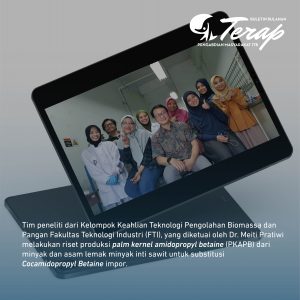
Dibandingkan sodium lauryl sulphate (SLS) dan sodium lauryl ether sulphate (SLES) yang umum digunakan, CAPB bersifat lebih lembut dan lebih tidak menyebabkan iritasi. Dengan harga CAPB produksi luar negeri yang lebih murah, produsen-produsen besar produk personal care masih menggunakan CAPB impor.
“Minyak kelapa sebagai bahan baku produksi CAPB memiliki kemiripan struktur dengan minyak inti sawit. Dengan rute produksi yang serupa dengan CAPB, minyak inti sawit dapat menghasilkan senyawa padanan CAPB, yaitu palm kernel amidopropyl betaine (PKAPB). PKAPB dapat diproduksi dari asam-asam lemak minyak inti sawit,” kata Dr. Meiti yang memimpin riset produksi PKAPB dari minyak dan asam lemak minyak inti sawit untuk substitusi Cocamidopropyl betaine impor.
Riset ini bertujuan untuk mengembangkan teknologi produksi PKAPB dari asam-asam lemak minyak inti sawit yang aplikatif pada industri berskala kecil dan menengah. Pada tahun pertama, riset dibagi menjadi dua agenda besar, yaitu menghasilkan PKAPB dengan perolehan serta kemurnian produk yang cukup tinggi dengan biaya produksi yang terjangkau, dan aplikasi produk PKAPB pada produk sanitasi berupa sabun cair.
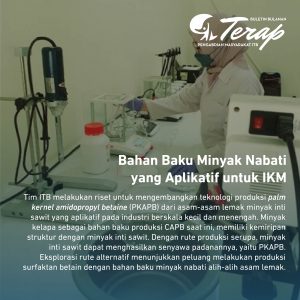
“Optimasi dilakukan terhadap variabel-variabel operasi seperti temperatur reaksi dan rasio reaktan terhadap umpan. Aplikasi produk PKAPB terhadap sabun cair dikarakterisasi untuk memastikan produk sanitasi yang layak dan aman. Pada tahun kedua, riset difokuskan pada pengembangan produksi PKAPB pada skala usaha kecil dan menengah (UKM),” papar Dr. Meiti.
Pada akhir tahun pertama ini telah dilakukan pembandingan tiga rute proses untuk surfaktan betaine, yaitu dari proses Keough (1960), Bade (1985), dan Acikalin (2006). Dengan menggunakan bahan baku berupa asam laurat murni, diperoleh rute proses yang paling unggul beserta kondisi operasinya. Kondisi operasi tersebut berhasil diaplikasikan pada asam-asam lemak dari minyak inti sawit dengan parameter kualitas yang layak dan setara dengan produk CAPB komersial.
Riset ini akan ditindaklanjuti dengan pengujian prototipe PKAPB dalam aplikasi di industri kosmetik mitra pada tahun kedua. “Eksplorasi rute-rute alternatif menunjukkan adanya peluang melakukan produksi surfaktan betain dengan bahan baku minyak nabati alih-alih asam lemak, dan riset dapat dikembangkan lebih lanjut terkait tujuan ini,” kata Dr. Meiti.
Video youtube: https://youtu.be/33H8atqYSac
Contact: meiti@itb.ac.id
Sumber & copyright: https://pengabdian.lppm.itb.ac.id/[:en]
The cosmetics industry in Indonesia experiences market growth every year. One important segment in the cosmetics industry is sanitary products which have driven the industry’s growth, especially since the COVID-19 pandemic. Unfortunately, until now Indonesia is still importing the raw material Cocamidopropyl betaine (CAPB) in large quantities, namely 15,000 tons/year or the equivalent of 20 million US dollars.
CAPB is a surfactant, which is the most important component in personal care products. “Surfactants are a group of compounds that have polar groups and nonpolar groups so they can dissolve oil in water,” said ITB Scientist from the Biomass and Food Processing Technology Expertise Group, Faculty of Industrial Technology (FTI), Dr. Ir. Meiti Pratiwi, S.T., M.T.

Compared to the commonly used sodium lauryl sulphate (SLS) and sodium lauryl ether sulphate (SLES), CAPB is gentler and less irritating. With the price of CAPB produced overseas being cheaper, large manufacturers of personal care products still use imported CAPB.
“Coconut oil as a raw material for CAPB production has a similar structure to palm kernel oil. With a production route similar to CAPB, palm kernel oil can produce the equivalent compound of CAPB, namely palm kernel amidopropyl betaine (PKAPB). “PKAPB can be produced from palm kernel oil fatty acids,” said Dr. Meiti is leading research on PKAPB production from palm kernel oil oil and fatty acids for substitution of imported Cocamidopropyl betaine.
This research aims to develop PKAPB production technology from palm kernel oil fatty acids that is applicable to small and medium scale industries. In the first year, research was divided into two major agendas, namely producing PKAPB with fairly high yields and product purity at affordable production costs, and application of PKAPB products in sanitation products in the form of liquid soap.

“Optimization is carried out on operating variables such as reaction temperature and reactant to feed ratio. PKAPB product applications for liquid soap are characterized to ensure proper and safe sanitary products. “In the second year, research focused on developing PKAPB production on the small and medium enterprise (UKM) scale,” explained Dr. Meiti.
At the end of this first year, three process routes for betaine surfactant were compared, namely the Keough (1960), Bade (1985), and Acikalin (2006) processes. By using raw materials in the form of pure lauric acid, the most superior process route and operating conditions are obtained. These operating conditions were successfully applied to fatty acids from palm kernel oil with adequate quality parameters and equivalent to commercial CAPB products.
This research will be followed up by testing the PKAPB prototype in applications in partner cosmetics industries in the second year. “Exploration of alternative routes shows that there is an opportunity to produce betaine surfactants using vegetable oil as raw material instead of fatty acids, and research can be further developed regarding this goal,” said Dr. Meiti.
Video youtube: https://youtu.be/33H8atqYSac
Contact: meiti@itb.ac.id
Sumber & copyright: https://pengabdian.lppm.itb.ac.id/[:]







